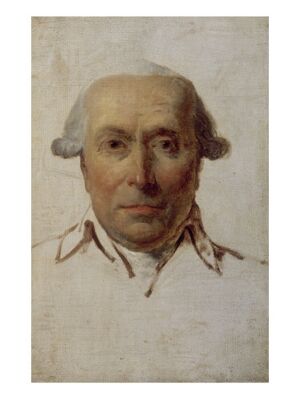Filippo Mazzei facts for kids
Filippo Mazzei (Italian pronunciation: [matˈtsei]), sometimes erroneously cited as Philip Mazzie (December 25, 1730 – March 19, 1816) was an Italian physician, winemaker, merchant, and author. A close friend of Thomas Jefferson, he was a strong supporter of the American Revolution and the American colonies' war for independence from Britain.
Early life and education
Mazzei was born Filippo Mazzei in Poggio a Caiano (Prato) in Tuscany as a son of Domenico and Elisabetta. He studied medicine in Florence.
Career
Mazzei practiced medicine in Italy and the Middle East for several years before moving to London in 1755 to take up a mercantile career as an importer.
In London, he worked as a teacher of Italian language. While in London he met the Americans Benjamin Franklin and Thomas Jefferson of Virginia. While doing work for Franklin, Mazzei shared his idea of importing Tuscan products, wine and olive trees, to the New World. They convinced him to undertake his next venture.
On September 2, 1773, Mazzei boarded a ship from Livorno to the Colony of Virginia, bringing with him plants, seeds, silkworms, and 10 farmers from Lucca. He visited Jefferson at his estate, and the two became good friends. Jefferson gave Mazzei an allotment of land for an experimental plantation. Mazzei purchased more land adjoining this gift of acreage and established a plantation he named Colle. They shared an interest in politics and liberal values, and maintained an active correspondence for the rest of Mazzei's life.
In 1779, following the emergence of the independent United States after the colonial victory in the American Revolutionary War, Mazzei returned to Italy as a secret agent for Virginia. He purchased and shipped arms to them until 1783. After briefly visiting the United States again in 1785, Mazzei travelled throughout Europe promoting republican ideals. He wrote a political history of the American Revolution, Recherches historiques et politiques sur les États-Unis de l'Amerique septentrionale, and published it in Paris in 1788. After its publication Mazzei became an unofficial roving ambassador in Europe for American ideas and institutions.
While in the Polish–Lithuanian Commonwealth he became attached as a Privy Councilor at the court of King Stanislaus II. There he became acquainted with Polish liberal and constitutional thought, like the works of Wawrzyniec Grzymała Goślicki and ideas of Golden Freedoms and Great Sejm. King Stanislaus appointed Mazzei to be Poland's representative in Paris, where he again met Jefferson.
After Poland was partitioned between Russia and Prussia in 1795, Mazzei, along with the rest of the Polish court, was given a pension by the Russian crown. He later spent more time in France, becoming active in the politics of the French Revolution under the Directorate. When Napoleon overthrew that government Mazzei returned to Pisa, Italy. He died there in 1816. After his death the remainder of his family returned to the United States at the urging of Jefferson. They settled in Massachusetts and Virginia; Mazzei's daughter married a nephew of John Adams.
He was buried at the Suburbano Cemetery in Pisa.
Acknowledgment
The contribution of Philip Mazzei to the U.S. Declaration of Independence was acknowledged by John F. Kennedy in his book A Nation of Immigrants, in which he states that:
The great doctrine 'All men are created equal' and incorporated into the Declaration of Independence by Thomas Jefferson, was paraphrased from the writing of Philip Mazzei, an Italian-born patriot and pamphleteer, who was a close friend of Jefferson. A few alleged scholars try to discredit Mazzei as the creator of this statement and idea, saying that "there is no mention of it anywhere until after the Declaration was published". This phrase appears in Italian in Mazzei's own hand, written in Italian, several years prior to the writing of the Declaration of Independence. Mazzei and Jefferson often exchanged ideas about true liberty and freedom. No one man can take complete credit for the ideals of American democracy.
Legacy
A 40-cent United States airmail stamp was issued in 1980 to commemorate the 250th anniversary of Mazzei's birth.
The World War II Liberty Ship SS Filipp Mazzei was named in his honor.
See also
- American Revolution
- Patrick Henry
- George Mason
- James Monroe
- William Paca
- Francesco Vigo
- John Page
- Founding Fathers of the United States
- List of important people in the era of the American Revolution


